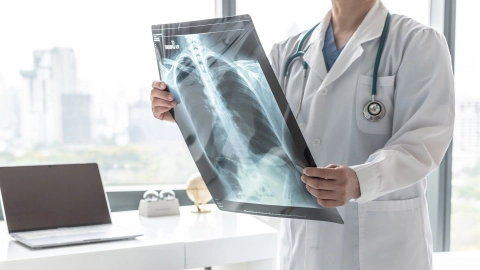Healthy living Smoking and quitting
ICD codes: F17 What are ICD codes?
Many people like to enjoy a cigarette during a break or while drinking a beer. Among other things, smoking increases the risk of cancer and many infectious diseases and negatively impacts physical fitness and the cardiovascular system. There are also various forms of support to help you quit smoking.
At a glance
- Smoking increases the risk of developing various health conditions.
- Smokers are more susceptible to infectious diseases like the flu and pneumonia and have a greater risk of developing many types of cancer, particularly lung cancer and malignant tumors of the mouth and throat.
- Smoking is highly addictive. Therefore, it is best to never even start.
- There are various strategies and programs that can help smokers stop smoking.
- Pregnant women should never smoke because smoking increases the risk of health problems for developing babies.
Note: The information in this article cannot and should not replace a medical consultation and must not be used for self-diagnosis or treatment.

What is smoking?
Most smokers try at some point to quit smoking. Smoking a cigarette after a meal, during a break, or while drinking a beer is a habit for many people. However, there are many good reasons to quit smoking: for example, smoking increases the risk of developing various diseases and is also quite expensive. However, it is not always easy to break a habit like smoking. It often takes multiple attempts.
What are the effects of smoking?
Smoking is unhealthy. Smokers are more susceptible to infectious diseases like the flu, colds, and pneumonia, among other things. Smoking can also lead to a chronic cough and lung disease. Smoking also negatively affects physical fitness and damages the cardiovascular system. This can lead to complications like heart attack and stroke.
Video What is the lung disease COPD?
The video below explains the possible symptoms, causes, and treatment methods of the lung disease COPD.
This and other videos can also be found on YouTube
Watch nowThe privacy policy indicated there applies.
The risk for numerous types of cancer, particularly lung cancer and malignant tumors of the mouth and throat, is also increased in smokers.
Smoking also promotes gingivitis and periodontitis and affects overall tooth health.
Wounds heal more slowly in smokers resulting in the additional risk for complications after surgery.
Smoking during pregnancy impacts the development of the unborn child. Nicotine and harmful substances from the smoke reduce the supply of oxygen. That is one of the reasons why pregnant women who smoke are more likely to miscarry. There is also an increased risk that the child will be premature, too small, or weigh too little.
How can people be prevented from starting to smoke?
Once someone has become addicted to nicotine, it is very difficult to quit smoking. Therefore, it is best to never even start smoking. However, a majority of smokers start smoking in their youth. Young people are often not particularly worried about their health.
Many parents wonder how they can stop their children from starting to smoke. On the one hand, parents should be aware of the important function of role models: having parents, siblings, or friends who smoke makes a person much more likely to begin smoking. On the other hand, it is good for parents to have an open and honest conversation with their children about the risks posed by smoking. Tip: it is often helpful to be patient, to listen, and to avoid criticism.
How can a smoker quit smoking?
There are various ways and strategies for giving up smoking. Asking for help at an early stage is not a sign of weakness. After all, quitting smoking always presents a considerable challenge. And, the sooner you quit smoking, the better this is for your health. Many people find it easier with support, although multiple attempts are usually still needed. For example, doctors, health centers, and self-help groups can provide support. Quality-approved smoking cessation programs are sponsored by health insurance providers.
When quitting, nicotine replacement therapy can relieve the physical symptoms of withdrawal and increase the chances of successfully stopping smoking for good. Tobacco is replaced by nicotine patches or gum, for example. Certain medications can help with withdrawal.
E-cigarettes may help some people to quit smoking tobacco. Their steam contains fewer toxins than tobacco smoke. However, they are not completely harmless – their steam contains harmful substances and usually also nicotine. People who use e-cigarettes to help them stop smoking should therefore use them for a limited time only. If they are used in addition to regular cigarettes, the impact on health may increase depending on the user’s smoking habits.
Heated tobacco products are not suitable for people trying to quit nicotine or tobacco.
For more information about quitting smoking, visit gesundheitsinformation.de.
What happens after quitting smoking?
Most people who successfully stop smoking gain some weight. This may be noticeable in the first year in particular. The reason for this is not only that smoking suppresses the appetite, so that people who no longer smoke eat more food or have more frequent snacks but also that their metabolism changes. The changes in weight can vary greatly. Some people do not gain any weight while some lose weight and others gain more than 5 kilos.
Without question, it is healthier to gain a little weight than to continue smoking. Metabolism and weight can normalize again over time.
Stopping smoking – when does the body recover?
How quickly does the body recover when you stop smoking? The video below provides information on this.
This and other videos can also be found on YouTube
Watch nowThe privacy policy indicated there applies.
- Barnes J, McRobbie H, Dong CY et al. Hypnotherapy for smoking cessation. Cochrane Database Syst Rev 2019; (6): CD001008.
- Batra A, Kiefer F, Andreas S et al. S3-Leitlinie „Rauchen und Tabakabhängigkeit: Screening, Diagnostik und Behandlung“. AWMF-Registernummer 076-006. 01.2021.
- Deutsche Gesellschaft für Pneumologie und Beatmungsmedizin (DGP). Empfehlungen zum Umgang mit der elektronischen Zigarette (E-Zigarette). 06.2022.
- Deutsches Krebsforschungszentrum (DKFZ). E-Zigaretten und Tabakerhitzer - ein Überblick. 10.2020.
- Edwards SA, Bondy SJ, Callaghan RC et al. Prevalence of unassisted quit attempts in population-based studies: a systematic review of the literature. Addict Behav 2014; 39(3): 512-519.
- Hartmann-Boyce J, McRobbie H, Lindson N et al. Electronic cigarettes for smoking cessation. Cochrane Database Syst Rev 2020; (10): CD010216.
- United States Public Health Service Office of the Surgeon General, National Center for Chronic Disease Prevention and Health Promotion, Office on Smoking and Health. Smoking Cessation: A Report of the Surgeon General. 2020.
- White AR, Rampes H, Liu JP et al. Acupuncture and related interventions for smoking cessation. Cochrane Database Syst Rev 2014; (1): CD000009.
- World Health Organization (WHO). WHO report on the global tobacco epidemic 2021: addressing new and emerging products. 07.2020
In cooperation with the Institute for Quality and Efficiency in Health Care (Institut für Qualität und Wirtschaftlichkeit im Gesundheitswesen) (IQWiG).
As at:







